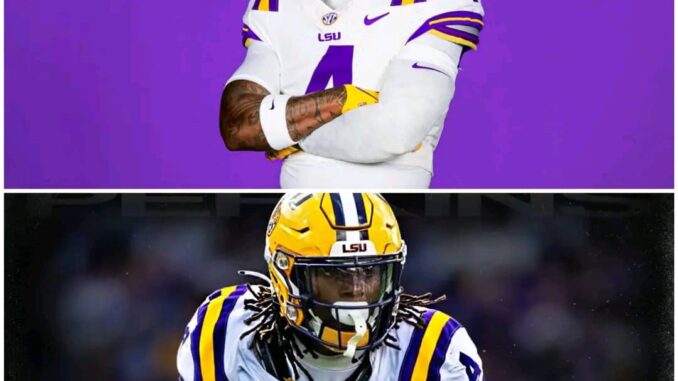
SHOCKING NEWS: LSU Football Star Harold Perkins Jr. Turns Down Massive $7.7 Million NIL Deal from Tennessee, Reaffirms Commitment to Tigers!
BATON ROUGE, LA – In a decision that has sent shockwaves across the collegiate football landscape and ignited fervent discussions about the evolving landscape of Name, Image, and Likeness (NIL) deals, LSU football phenom Harold Perkins Jr. has reportedly rejected a staggering $7.7 million NIL offer from the University of Tennessee. This jaw-dropping sum, more than double his current earnings, was not enough to sway the star linebacker from his unwavering commitment to finish his college career with the LSU Tigers.
The news, which broke from sources close to the Perkins camp and was quickly corroborated by national sports media, has stunned many within the industry. In an era where top collegiate athletes are increasingly navigating a complex web of financial incentives, Perkins’s steadfast loyalty to LSU stands as a powerful counter-narrative, prioritizing team, development, and personal conviction over unprecedented monetary gain.

“This was never about the money for me,” a source close to Harold Perkins Jr. conveyed, reflecting the linebacker’s sentiment. “Harold is committed to LSU, to his teammates, and to the coaching staff that has helped him grow. He believes in the program, and he wants to win a national championship here. The offer from Tennessee was significant, but his heart is in Baton Rouge.”
Harold Perkins Jr. has quickly established himself as one of the most electrifying defensive talents in college football. His explosive speed, relentless pursuit, and game-changing plays have made him a fan favorite and a nightmare for opposing offenses. As a pivotal force on LSU’s defense, his presence is instrumental to the Tigers’ aspirations for sustained success in the highly competitive Southeastern Conference (SEC).
The $7.7 million offer from Tennessee underscores the aggressive nature of NIL recruitment, particularly among rival SEC programs vying for elite talent. Such a figure represents a substantial investment, signaling Tennessee’s clear intent to bolster its roster with premier players. However, Perkins’s rejection highlights that even in the most financially incentivized environment, factors like team chemistry, coaching relationships, and a sense of belonging can still hold sway for individual athletes.
For LSU, Perkins’s decision is an immeasurable victory. It not only retains a generational talent on their roster but also sends a resounding message about the strength of their program’s culture and the genuine connections fostered between players and coaches. In a time when transfer portal movements are frequent and often influenced by NIL opportunities, Perkins’s loyalty provides a significant boost to team morale and recruiting efforts for future classes.’

Head Coach Brian Kelly, while unable to comment directly on specific NIL offers, has consistently emphasized the importance of building a strong team culture. Perkins’s choice validates this philosophy, reinforcing the idea that LSU offers more than just football — it offers a home and a pathway to holistic development.
The implications of this news extend beyond the two universities involved. It prompts a broader discussion about the true motivations of student-athletes in the NIL era. While many embrace the financial opportunities, Perkins’s stance suggests that for some, the traditional collegiate experience, the pursuit of championships with a chosen team, and the bond with a specific institution remain paramount. His actions could serve as a powerful example, inspiring other athletes to consider their long-term goals and values when faced with similar propositions.
Fan reactions across social media have been swift and passionate. LSU fans are celebrating Perkins’s commitment as a testament to the “Tiger spirit,” while Tennessee fans are undoubtedly disappointed but perhaps also acknowledging the player’s conviction. The debate over “WOKE” agendas in sports, as referenced by Perkins, is also likely to intensify, with various viewpoints clashing on the appropriate role of social messaging in athletic events.
As the college football season approaches, Harold Perkins Jr.’s decision will undoubtedly be a major storyline. His dedication to LSU, even in the face of unprecedented financial temptation, paints a compelling picture of a player who is determined to write his own legacy, one defined not by dollar signs, but by loyalty, grit, and the pursuit of gridiron glory with the team he calls home. His actions serve as a powerful reminder that in a world of increasing complexity, core values can still shine through, proving that a commitment to something larger than oneself can be the most valuable currency of all.
Leave a Reply